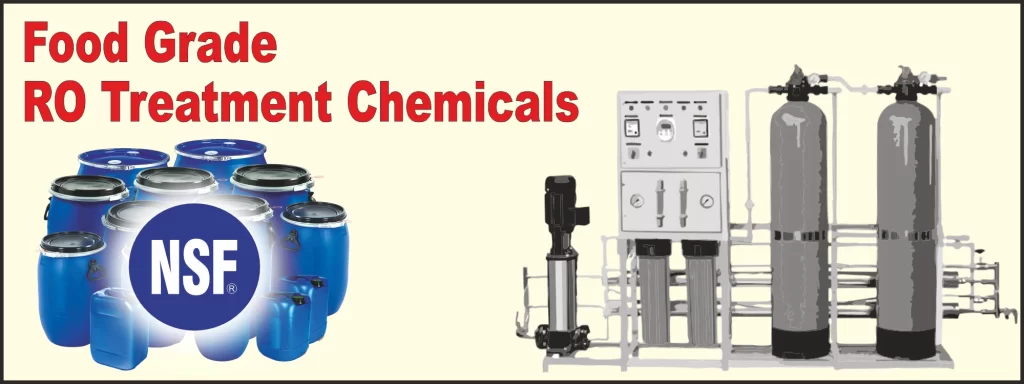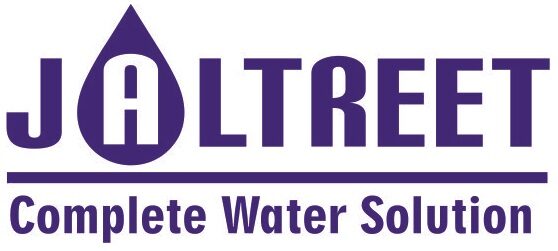
NSF CERTIFIED R.O. SYSTEMS TREATMENT CHEMICALS
The performance of a Reverse Osmosis (R.O.) system gets hampered due to impurities that build up on the membrane surface during operations. Suspended solids, microorganisms and mineral scale can foul membrane elements. These deposits can cause loss in output and/or rejection levels and reduce total system performance. Our formulations based on modern polymers help to greatly reduce deposits, impurities, and scale in your system’s membranes.
R O ANTI-SCALANT (CERTIFIED TO NSF/ANSI 60)
Scaling is caused in membranes because the level of hardness salts in the water becomes highly concentrated as it passes through the RO unit. In smaller units’ scale formation can be prevented by base exchange softening the make-up water but for larger systems that is very expensive. We have developed a range of easy to handle, cost effective RO Antiscalants which increase the solubility of the hardness salts so they remain in solution rather than forming scale on the membrane. Our cost-effective advance Polymer based RO Antiscalant will inhibit a wide range of foulants including calcium carbonate, calcium sulphate, barium sulphate, strontium sulphate, calcium fluoride, silica and iron.
Product Range
- WTRD300 For Moderate TDS & Silica (NSF Certified)
- WTRD301 For Moderate TDS & Silica (High pH) (NSF Certified)
- WTRD310 For Moderate TDS & High Silica (NSF Certified)
- WTRD320 For High TDS & High Silica (NSF Certified)
- WTRD305 For Moderate TDS & Silica (with Phosphate) (NSF Certified)
R O CLEANER (CERTIFIED TO NSF/ANSI 60)
Regular chemical cleaning of RO membranes will help to increase its performance and will extend its useful life. The main concern with cleaning is that it should be done before the situation gets too bad as then the membrane may become fouled and will have to be replaced. Cleaning should be undertaken whenever the permeate flux, differential pressure or conductivity changes to undesirable values. However, it is better to clean the membrane regularly after a predetermined interval. Each type of fouling requires a different cleaning strategy depending on the water supply, membrane fouling may be inorganic, organic, microbiological or a combination.
R O ACIDIC CLEANER (CERTIFIED TO NSF/ANSI 60)
Our Acidic Cleaner is a highly effective multipurpose cleaning chemical which very effectively removes deposits including carbonate, silicate, sulphate, phosphate of Calcium, Barium, Strontium and Iron scales.
Product Range
- WTROC1600 Acidic Cleaner (NSF Certified)
R O ALKALINE CLEANER (CERTIFIED TO NSF/ANSI 60)
Our Alkaline Cleaner is highly effective in removing deposits including colloids and organic bio foulants. It is a combination of Alkaline cleaner and a novel surfactant.
Product Range
- WTROC1800 Alkaline Cleaner (NSF Certified)
R O BIOFOULING CLEANER (CERTIFIED TO NSF/ANSI 60)
Our DBNPA-based microbicide is highly effective against all types of biofilm including sessile & planktonic organisms. It helps to clean organic debris and biofilm & keeps the membrane surface free from biofouling. Its Broad-spectrum efficacy makes it compatible with tap water, brackish water, seawater & other chlorine resistance membranes.
Product Range
- WTROB900 Food Grade DBNPA Based Biocide
- WTROB800 Food Grade Silver Hydrogen Peroxide Based Biocide
PH BOOSTER (CERTIFIED TO NSF/ANSI 60)
The control of water pH and alkalinity levels is very important in order to reduce corrosion. Depending on the natural feed water alkalinity, it is often necessary to add an alkalinity builder in order to establish the correct water chemistry by raising the water pH which helps to protect the system from acid corrosion.
Product Range
- WTP200 To Increase pH in RO Water (NSF Certified)
